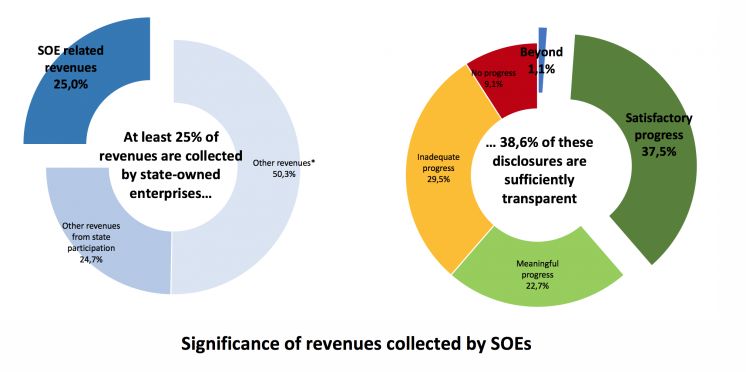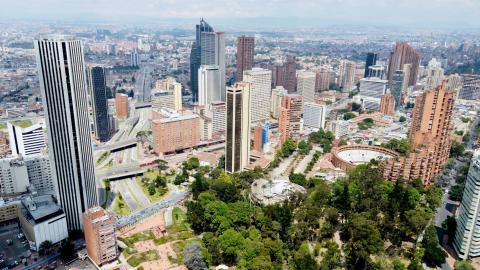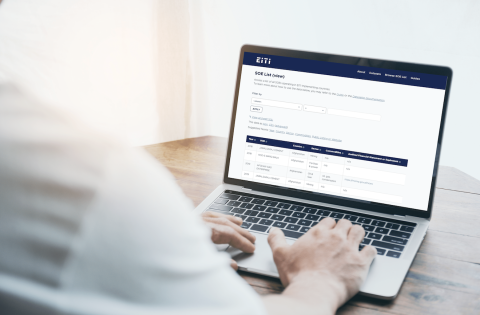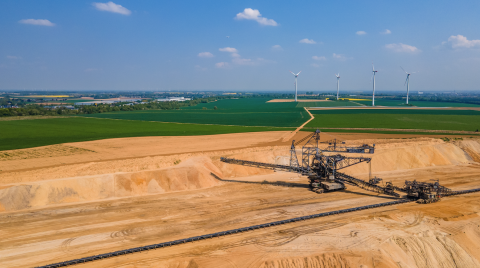
Trading up: A business case for SOE transparency
Strengthening transparency and accountability of state-owned enterprises
The EITI’s 8th Global Conference catalyses next steps in SOE transparency.
In many resource-rich countries, the state is directly involved in the extractive sector through its own state-owned enterprises (SOEs). The sale of a state’s natural resources is often a significant revenue stream for national budgets and development priorities. To date, 40 EITI countries have reported revenues from state-owned oil, gas and mining companies. These disclosures allow stakeholders to analyse SOE performance, from the sale of resources to how these are allocated and spent.
The EITI Global Conference held in Paris last month brought together stakeholders from state-owned enterprises (SOEs), their government shareholders, commodity traders and civil society to discuss the business case for embedding transparency in SOEs’ systematic disclosures.
Participants took stock of progress in SOEs’ disclosures and catalysed commitments to improving systematic transparency of a diverse group of SOEs in both EITI implementing countries and beyond. Commitments included Ghana’s development of a corporate disclosure policy to Iraq’s plans to systematically disclose EITI data through SOEs’ audited financial statements and annual reports. Building on Petronas’ recent certification under the anti-bribery ISO 37001, Chief Integrity Officer Dato Rohaizad Yaakob publicly called on Malaysia to become an EITI implementing country.
After the event, the newly appointed Managing Director of the Nigerian National Petroleum Corporation (NNPC), a long standing member and supporter of the EITI’s SOE working group, Mele Kolo Kyari remarked: “We have learned many lessons from our work on commodity trading transparency with the EITI and contributed to the global efforts to improve first trade transparency.” He went on to add: “Timely and systematic disclosures of data required by the EITI will be a key tool for demonstrating the accountability of our financial management and improving relations with stakeholders.”

What’s the link?
Two key themes of the EITI Global Conference – systematic disclosures and anti-corruption – go to the heart of the EITI’s efforts with SOE transparency. SOEs’ key role in managing extractives revenues on behalf of the state puts them at the front of efforts to curb corruption in the extractives. Almost half of the USD 2.5tn in extractives revenues disclosed through EITI reporting to date come from the sale of the state’s share of minerals, oil and gas. While at least 25% of these are marketed through SOEs, only 39% of these disclosures are sufficiently transparent according to EITI Validation.*
With national oil companies spending or retaining a 78% of their USD 1.6tn in revenues in 2016 in a sample of 30 countries reviewed by the Natural Resource Governance Institute (NRGI), their financial management is central to a transparent and accountable management of extractives revenues. Timelier systematic disclosures of these SOEs’ key financials will be key to strengthening accountability and good governance.
Leveraging lessons learned
Transparency in the sale of the state’s in-kind revenues through the EITI has gradually improved since the last Global Conference in 2016. EITI disclosures by extractives SOEs mandated since the 2013 EITI Standard are increasingly matched by those of commodity traders, most recently in Gunvor’s first disclosures in June. The EITI’s targeted effort for SOE transparency, which was agreed in October 2018, will broaden systematic disclosures of EITI data to SOEs in countries that have yet to implement the EITI, based on demand and relevance.
Committing to ambition
Session participants included a broad range of extractives SOEs, ranging from publicly-listed companies like Norway’s Equinor, Malaysia’s Petronas and Argentina’s YPF to wholly state-owned entities like the Ghana National Petroleum Corporation (GNPC), Iraq’s North Oil Company (NOC) and Nigeria National Petroleum Corporation (NNPC). While circumstances and challenges varied widely, SOEs recognised a common business case for improving relations with investors, partners, vendors and broader civil society stakeholders.
Improving relations and building trust with stakeholders will be achieved through systematic reporting of both financial and non-financial aspects of SOE’s operations and business. New provisions of the 2019 EITI Standard, covering aspects such as SOEs’ governance structures, will help contextualise the often complex SOEs’ financial disclosures.
More than the sum of its parts
Disclosures by individual SOEs will help improve their accountability both to their owners in government and to the broader citizenry, as well as to business counterparts and minority shareholders. They will also provide the basis for cross-country performance benchmarking. NRGI’s recently-launched national oil company database is already a powerful tool for comparative analysis of key financial metrics across comparable oil and gas SOEs. The database draws on greater public disclosures by SOEs, which will further develop the tool’s relevance for SOE managers.
Going forward, through the targeted effort for SOE transparency, the EITI and its partners will expand and tailor support to SOEs to identify information gaps in SOE disclosures vis-à-vis EITI Requirements, by developing corporate disclosure policies and improving SOE engagement with public and business partners, among other areas. Interested SOEs are welcome to contact the EITI International Secretariat regarding the targeted effort on SOE transparency.
- For more information, check out this file on extractive sector revenues related to state-owned enterprises.
- Learn more about this session at the EITI Global Conference here.





